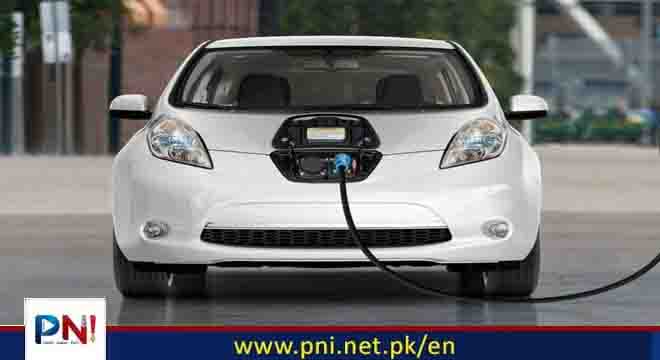ISLAMABAD, Sep 25 : As the world embraces electric mobility, Pakistan is not just aiming for a 30% electric vehicle (EV) penetration by 2030; it is setting the stage for a competitive presence in the global EV market.
With a flurry of recent government initiatives and a policy deadline just one month away, the nation is demonstrating its commitment to becoming a key player in the EV revolution. It is also determined to achieving a remarkable 90% transformation by 2040.
The driving force behind Pakistan’s initiative to adopt this policy is the vision of a greener nation, aimed at reducing the environmental impact of transportation.
Additionally, this shift seeks to alleviate the financial burden of import bills associated with traditional fuel costs, which have been detrimental to the national economy.
“Currently, two-three-wheeler and four-wheeler EVs population in the country is almost 45,000 [0.16% of total] and 2,600 [0.06% of total] respectively, with a target to take the number to 371,577 during the current year and 90% by 2040,” Deputy Chief of Large Enterprises Development (LED) at the Ministry of Industries and Production Abdus Samad told APP.
For this purpose, Prime Minister Shehbaz Sharif established a Steering Committee to formulate a comprehensive policy to promote local manufacturing and facilitate the early adoption of electric vehicles (EVs), including New Energy Vehicles (NEVs).
The committee will guide its efforts according to international best practices while addressing local needs. It plans to create a nationwide strategy for deploying sufficient charging stations, including fast-charging facilities, in key urban centers and along major highways. This initiative will be supported by Oil Marketing Companies (OMCs) and the National Highway Authority (NHA) to ensure that existing EVs can effectively serve inter-city and intra-city transport.
Furthermore, the committee will oversee the replacement of conventional vehicles within the federal government and will recommend a suitable tariff structure for charging stations. It will also establish a robust tariff and duty framework to encourage early adoption and local manufacturing of EVs.
Moreover, it is tasked with aligning national climate goals by focusing on reducing carbon emissions, promoting clean energy use in transportation, and raising public awareness about the benefits of EVs and their environmental impact.
To incentivize demand, the body will develop a comprehensive financial structure that includes grants from the federal budget. Close collaboration with provincial governments, as well as the administrations of Gilgit-Baltistan and Azad Jammu and Kashmir, will be essential for developing synergies in this initiative.
Following the committee formation, Minister for Industries and Production Rana Tanveer Hussain on Tuesday chaired its maiden meeting that decided to prepare a revised National Electric Vehicle Policy in one month.
Reflecting on the current EV landscape, the ministry official noted that the global EV population has reached 28 million and is growing at an annual rate of approximately 25%, according to the International Energy Agency.
The earlier NEVP-2019 provided a concessionary duty and tax framework, along with soft credit schemes; however, these were only partially implemented in 2021.
The adoption of EVs has accelerated in the past two years, with 49 licenses granted to two- and three-wheeler EV manufacturers since 2022, supporting a production capacity of 4 million vehicles annually.
Currently, 25 manufacturers are engaged in production, and the first license for four-wheeler EV manufacturing—capable of producing 6,000 vehicles per year—was issued in September, with production expected to commence by year’s end.
In response to inquiries about immediate measures to enhance market penetration, Deputy Chief Abdus Samad emphasized the need for a robust charging infrastructure, along with established standards and regulations from the National Energy Efficiency & Conservation Authority (NEECA) and preferential tariffs set by the National Electric Power Regulatory Authority (NEPRA) and electricity distribution companies.
Media spokesperson for the Ministry of Climate Change and Environmental Coordination Muhammad Saleem talking to APP said, as part of broader efforts to combat growing air pollution, reduce dependency on imported fossil fuels, and address climate change, Pakistan has set this ambitious yet achievable goal of electrifying 30% of its vehicles by 2030.
This initiative aligns with global efforts to lower carbon emissions and transition to more sustainable energy sources.
With countries like Norway, Sweden, and the Netherlands already having achieved significant EV penetration, the global EV market is expected to reach 140 million units by 2030. Major players like Tesla, Volkswagen, and General Motors are investing heavily in EV technology, while countries like China, the US, and Japan are offering incentives and subsidies to encourage the adoption of EVs. The International Energy Agency (IEA) estimates that by 2040, EVs will account for over 50% of new car sales globally.
In this context, Pakistan’s goal of achieving 30% electric vehicle (EV) penetration by 2030 is vital for reducing its carbon footprint and oil import costs while promoting environmental sustainability.
Researchers and experts at the Pakistan Institute of Development Economics (PIDE) believed that EVs offered a promising pathway for Pakistan to achieve a cleaner, more sustainable future by reducing carbon emissions and decreasing reliance on fossil fuels.
However, they said, despite the introduction of an EV policy in 2019, progress remained slow due to significant infrastructural and economic challenges.
“Transitioning to EVs presents a great prospect to Pakistan, a country faced with severe environmental challenges including persistent smog during winters and a huge import burden due to being an oil importing country,” they said while talking to APP.
However, they said the affordability of EVs remained a critical issue, as higher prices compared to conventional vehicles made them less accessible to most of Pakistan’s population.
They called for consistency and clear ‘policy signals’ to remove hindrances towards EV adoption, adding “Pakistan has the potential to foster a sustainable EV ecosystem and drive long-term economic growth.”
Follow the PNI Facebook page for the latest news and updates.









